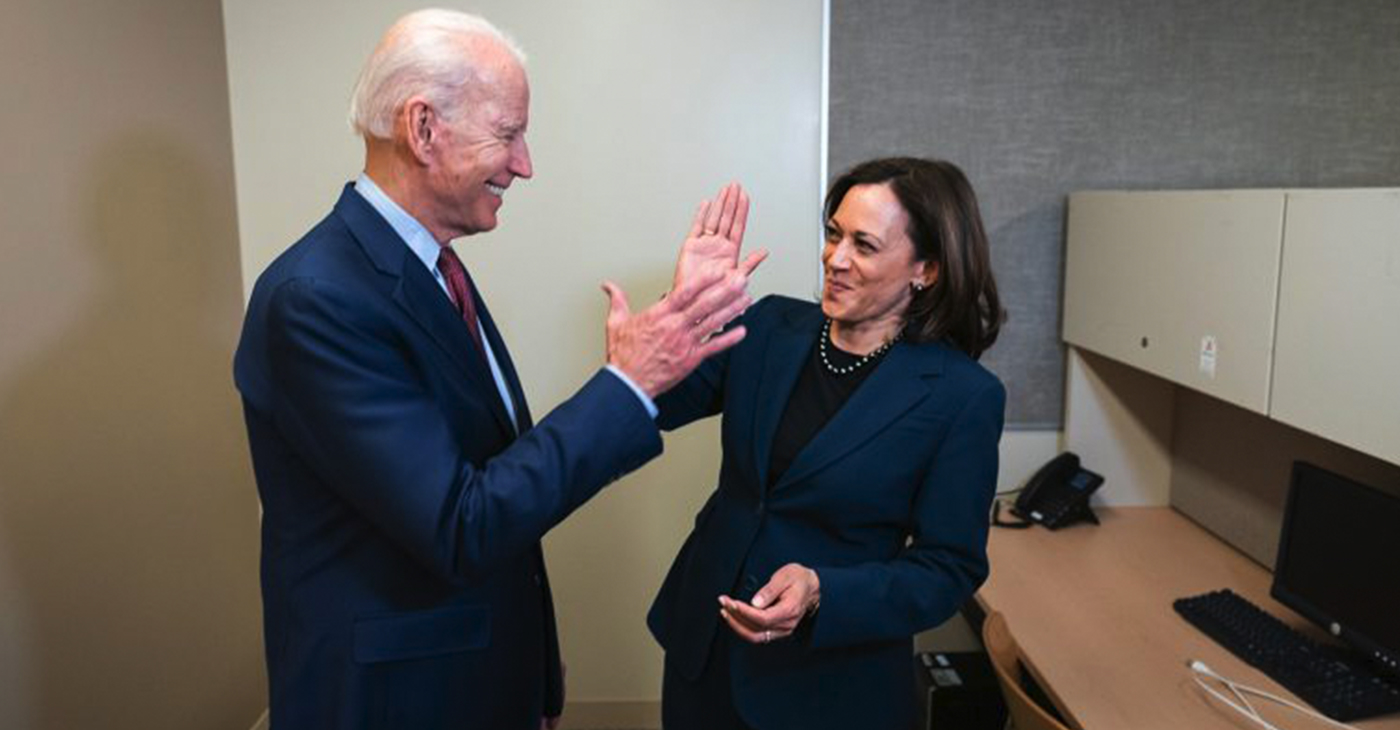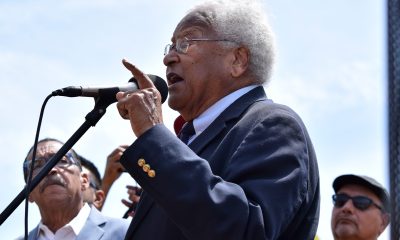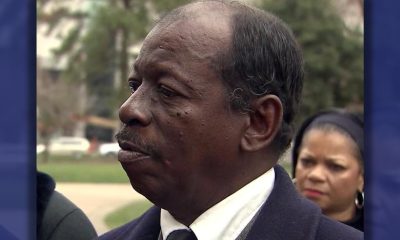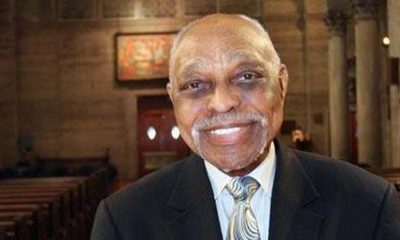#NNPA BlackPress
IN MEMORIAM: Controversial public housing tenant leader, James Robinson, passes in North Carolina
NEW TRI-STATE DEFENDER — To friends and those who knew him best, Mr. Robinson was a fierce advocate for public housing residents. Others held a much different view. Prior to his resignation in 1997, members of the Memphis Housing Authority launched an investigation into whether he had “misrepresented his income to receive subsidized housing.” He had been president of the CRC for seven years.
By Dr. Sybil C. Mitchell, New Tri-State Defender
A community leader and a voice for change to some, former Citywide Residents Council (CRC) President James Robinson passed away recently in North Carolina, with services planned for Memphis. He was 67.
“He had moved to North Carolina with one of his daughters,” said former Memphis City Schools Board Member Sara Lewis, a family friend, who said, “James was sick for a long time.”
Mr. Robinson, a minister, was a “phenomenal character” with a photographic memory, Lewis said.
“He knew the law and he knew the codes. He changed public housing for the better during his tenure as head of the tenant’s association. He got us the money to fix up the homes of our seniors. They needed to be wheelchair accessible and upgraded with other accommodations for them.”
To friends and those who knew him best, Mr. Robinson was a fierce advocate for public housing residents. Others held a much different view. Prior to his resignation in 1997, members of the Memphis Housing Authority launched an investigation into whether he had “misrepresented his income to receive subsidized housing.” He had been president of the CRC for seven years.
MHA board members called for an investigation into Mr. Robinson’s finances after it was revealed that he worked as a paid consultant for a Nashville marketing firm, drove a 1997 Cadillac, and appeared in the courtroom of Judge Joe Brown declaring a $75,000 annual income. At the time, Mr. Robinson was paying $150 per month for a five-bedroom unit in Cypresswood Apartments.
Subsidized housing was assessed at 30 percent of the household’s monthly income, and to falsify information for the purpose of residing in public housing was considered a federal crime.
“James was the one who changed public housing for the better,” said Lewis. “He would say, ‘How in the world is anyone supposed to get out of poverty if every time someone gets a job, their rent goes up?’ He was very political.”
Lewis said Mr. Robinson “helped to engineer my first election to the school board. And he helped the Fords, too, back in the day. Public housing tenants were an important voting constituency that was overlooked many times. James said that it was not money that got candidates elected. It was people that got candidates elected.”
Asked about his car and a Whitehaven home where he paid the utilities, Mr. Robinson once forthrightly explained that he had worked for what he had.
“By the way, all this jewelry, designer suits, handmade shoes, I bought all that because I got a job,” Mr. Robinson told a group of probationers during a counseling session in Judge Joe Brown’s courtroom.
Parts of his speech aired on “Court TV” on January 9, 1996. Mr. Robinson offered MHA his “unpaid consultant, advisory services” for the following five years after he resigned.
Mr. Robinson, according to his attorney, did not resign to halt the investigation, but rather because “he was tired of being harassed by the news media.”
Services were incomplete.
This article originally appeared in the New Tri-State Defender
#NNPA BlackPress
NNPA NEWSWIRE — Reflecting on his long career, Biden expressed deep gratitude and pride. “Nowhere else on earth could a kid with a stutter from modest beginnings in Scranton and Claymont one day sit behind the Resolute Desk in the Oval Office. But here I am. That’s what makes America special,” he remarked, his voice tinged with emotion.
The post first appeared on BlackPressUSA.

Biden: Our Democracy Demands New Leadership
By Stacy M. Brown, NNPA Newswire Senior Correspondent
@StacyBrownMedia
In an impassioned address from the Oval Office, President Joe Biden laid bare his decision to step down from the 2024 presidential race, urging Americans to embrace a new generation of leadership. “Saving democracy is more important than any title. It’s time to pass the torch to younger voices,” Biden declared in an address that signaled a transformative shift in American politics.
Following his decision over the weekend to bow out of the race for re-election, Biden’s announcement was a clarion call for renewal. Stressing the moment’s urgency, Biden emphasized that the future of democracy depends on fresh, dynamic leadership. He endorsed Vice President Kamala Harris as the embodiment of this new era. “Years ago, I described myself as a transitional candidate, and now it’s time for that transition to take full effect,” Biden said, positioning Harris as the future of the Democratic Party.
While refraining from mentioning former President Donald Trump by name, Biden clarified that he views the twice impeached and 34 times convicted felon Republican presidential nominee as a fundamental threat to democratic values. “My record as president, my leadership on the global stage, and my vision for America’s future all merited a second term,” Biden stated. “But nothing can stand in the way of safeguarding our democracy. That includes personal ambition. So, I’ve decided the best path forward is to pass the torch to a new generation.”
Reflecting on his long career, Biden expressed deep gratitude and pride. “Nowhere else on earth could a kid with a stutter from modest beginnings in Scranton and Claymont one day sit behind the Resolute Desk in the Oval Office. But here I am. That’s what makes America special,” he remarked, his voice tinged with emotion.
Biden acknowledged that doubts about his ability to defeat Trump influenced his decision. “I revere this office, but I love my country more,” he said. “It’s been the honor of my life to serve as your president. But in defense of democracy, which is at stake, I think it’s more important than any title.”
Biden said he is determined to address crucial issues for the remainder of his term. His agenda includes lowering family costs, defending personal freedoms, protecting voting rights, combating cancer, addressing gun violence, and advocating for Supreme Court reform. Internationally, he said he aims to strengthen NATO, support Ukraine, and seek an end to the conflict in Gaza.
Biden’s endorsement of Harris has galvanized the Democratic Party, with Harris swiftly securing the backing of a majority of Democratic delegates. “I’m not going anywhere,” Biden reassured his campaign staff, now supporting Harris. “I’m going to be out there on the campaign trail with her, working tirelessly as both a sitting president and a campaigner.”
The landmark address, along with Biden’s anticipated speech at the Democratic National Convention, could prove pivotal in defining his legacy. “In a few months, Americans will decide the direction of our nation’s future,” Biden stated. “I have made my choice. I’ve expressed my views. Now the decision is in your hands, the hands of the American people.”
In the days before his decision, Biden confided in close advisors about his concerns regarding another run against Trump. His acknowledgment of those doubts underscored his commitment to putting the country’s needs above his ambitions. “The defense of democracy must come before all else,” he reiterated.
As Biden prepares to support Harris in her campaign, he remains focused on his presidential duties. His administration continues to push for significant legislative achievements, reinforcing his enduring commitment to the American people. “In just a few months, the American people will choose the course of America’s future,” Biden said. “The great thing about America is here, kings and dictators do not rule. The people do. History is in your hands. The power is in your hands. The idea of America lies in your hands.”
The post first appeared on BlackPressUSA.
#NNPA BlackPress
PRESS ROOM: Reparations Movement Partners Globally Mourn the Passing of U.S. Congresswoman Sheila Jackson-Lee
NNPA NEWSWIRE — we acknowledge the powerful legacy of U.S. Congresswoman Sheila Jackson-Lee. She was a steadfast leader in the fight for reparatory justice, carrying forward the legislative baton from the late U.S. Congressman John Conyers in 2018.
The post PRESS ROOM: Reparations Movement Partners Globally Mourn the Passing of U.S. Congresswoman Sheila Jackson-Lee first appeared on BlackPressUSA.

[July 22, 2024 – Chicago, IL] With an extremely heavy heart and a profound sense of loss, we acknowledge the powerful legacy of U.S. Congresswoman Sheila Jackson-Lee. She was a steadfast leader in the fight for reparatory justice, carrying forward the legislative baton from the late U.S. Congressman John Conyers in 2018. Her relentless efforts nearly brought HR 40 to passage in the House of Representatives in 2022, missing by just one vote. Her leadership was pivotal in advancing the bill out of the Judiciary Committee in April 2021 after a historic debate. Even after her diagnosis, Rep. Jackson-Lee fiercely collaborated with reparations leaders, pushing for President Biden to establish an HR40-like commission by Executive Order. She believed this executive path was crucial for addressing centuries of injustice. Despite setbacks in meetings with the President’s team, she remained optimistic and urged us to stay ready for progress.
The Earn the Black Vote Collaborative formed in 2023 in response to her urging to continue the fight for reparations. On April 25, 2024, the Collaborative released a poll showing significant support for President Biden to issue an Executive Order for Reparations. Congresswoman Jackson-Lee championed the poll’s findings, emphasizing the critical importance of reparations to African American and progressive communities. Her vision was clear: an Executive Order to create a federal reparations commission could drive transformative Black voter turnout and move the ball toward justice. She had wanted the Executive Order done by Juneteenth. Tragically, just a month after Juneteenth, she left us. We have lost a great leader for reparatory justice. In honor of her legacy, we call for the establishment of the Executive Order by President Biden. We extend our deepest condolences to Representative Jackson-Lee’s family. We call on reparation activists, leaders, and legislators globally to stand with us as we honor her legacy. May the Ancestors and the Creator receive her with joy.
About the Author:
Kamm Howard is a national and international reparations scholar and activist working for over 20 years building grassroots movements to obtain reparations for African descendants in the United States.
CONTACT:
Reparations United Phone: 773-985-2990
Email: kamm@reparationsunited.org Website: https://reparationsunited.org/
The post PRESS ROOM: Reparations Movement Partners Globally Mourn the Passing of U.S. Congresswoman Sheila Jackson-Lee first appeared on BlackPressUSA.
#NNPA BlackPress
OP-ED: Vice-President Kamala is Ready!
CAPITAL OUTLOOK — As I noted in my Op-Ed, three weeks ago, our vice president is ready to be the next president of the United States. End of discussion! The delegates to the Democratic National Convention next month, should enthusiastically nominate her to lead the ticket. Vice-President Kamala Harris will energize the electorate; she will create great excitement and hope. President Biden’s decision has proven again that he loves this country; he is a dear patriot; and he is a great man!
The post OP-ED: Vice-President Kamala is Ready! first appeared on BlackPressUSA.

By Reverend Dr. RB Holmes, Jr.
We must commend and appreciate President Joseph Biden for being a quintessential leader and, perhaps, one of the best presidents in modern political history. He is not finished yet. He will complete his agenda of appointing qualified federal judges, reducing the cost of prescription drugs, working for a cease-fire in the Middle East, and building a stronger economy for all Americans. President Biden has endorsed his Vice-President, the Honorable Kamala Harris, to head the Democratic ticket for the presidency.
As I noted in my Op-Ed three weeks ago, our vice president is ready to be the next president of the United States. End of discussion! The delegates to the Democratic National Convention next month should enthusiastically nominate her to lead the ticket. Vice-President Kamala Harris will energize the electorate; she will create great excitement and hope. President Biden’s decision has proven again that he loves this country; he is a dear patriot; and he is a great man!
President Biden: Should he stay, or should he leave?
By Reverend Dr. RB Holmes, Jr.
This query is perhaps one of the greatest questions of the last 248 years. In my humble opinion, the answer to this question will decide what kind of nation we will leave to future generations. As it relates to baby boomers, the answer to this question will determine the quality of ourselves as it relates to, hopefully, “the bonus years” that remain.
The Democratic Party is having a proverbial meltdown since the June 27, 2024, debate debacle by President Biden. Democrats can’t get out of their way. Some believe that President Biden should step aside for what appears to be his failing health. Others in the party are standing with the president, saying, in essence, he should remain in the race. What are you saying? Should he stay, or should he leave?
Full disclosure: I am an independent. I once was a Democrat and even a Republican. The Republican Party ran me out of the party. I really couldn’t stay in a party that is destroying and dismantling programs and policies that I truly believed made this country great.
Let’s turn our attention back to the Biden challenge. I voted for President Biden and will gladly vote for him again if he remains in the race. President Joe Biden is a good man:
He is a man of great character and integrity.
He brought us through the worst pandemic in our lifetime. He didn’t recommend injecting “bleach.” He provided resources to struggling Americans to keep food on their tables and most importantly, he trusted the vaccine and the medical community’s advice. This president didn’t weaponize this deadly virus for political points.
President Biden helped bring this economy out of an impending recession and has advocated for the expansion of Medicaid rather than its elimination.
President Biden is bringing down the high cost of prescription drugs, especially for the elderly and the poor.
President Biden is fighting to save Obamacare, social security, the environment, and good-paying jobs for all Americans.
President Biden is a strong advocate for the Civic Rights Bill of 1964, The Voting Rights Bill of 1965, and the Fair Housing Bill of 1966.
President Biden is an advocate for diversity, equity, and inclusion (DEI).
President Biden is for affirmative action programs.
President Biden is for women making their own health decisions.
President Biden will stand up for the rights of the Dreamers. He hasn’t demonized immigrants. Unlike the Republican Party’s likely nominee, I don’t recall President Biden ever saying he doesn’t want people coming to the United States from those “s____ hole” countries.
President Biden has never been an advocate for white supremacy. Remember, he decided to run for president because of the pro-supremacy march in Charlottesville, Virginia. His slogan became “I am fighting for the soul of the nation!” Friends, unfortunately, this nation’s soul is sick. We need someone in that White House who does not give voice to white supremacy nor give support to the proud boys. President Biden is proud to be an American.
The question is whether President Biden should stay or go. Jesus said, “You will know them by their fruits. (St. Matthew 7:16) After the debate between President Biden and former President Donald J. Trump, begin to examine the fruit. In essence, I became a fruit inspector. Yes, the president acknowledged he had a bad debate and confirmed that he is no longer a smooth talker: his steps are slower, and he isn’t as articulate as he was in the past. The question is, who is? As a fruit inspector, I don’t think we ought to cut down the entire tree because of a bad branch.
Let me continue to examine the Biden fruit. Yes, it is an old tree, but old trees are full of shade, wisdom, hope, experience and tenacity. Biden was appointed by the first Black president to serve this country in 248 years, the honorable Barack Hussein Obama. Oh yes! He saw the good fruit. The powerful United States Congressman, the Honorable Jim Clyburn (D-SC), saw this good fruit when he enthusiastically endorsed Joe Biden in 2020 for president. I met Congressman Clyburn a few Sundays ago when he spoke at the Mount Zion Baptist Church in Albany, Georgia, where the pastor is Reverend Daniel Simmons. At that service, Congressman Clyburn told the story of an elderly woman at a funeral who asked him, “who was he voting for.” He told her Joe Biden and the rest is history. Congressman Clyburn is still standing with Joe Biden. Why? He has seen a fruit tree producing good fruit.
Congressman Clyburn has witnessed up front and close the good decisions that President Biden has made and will continue to make. The man has sound judgment, and he has wisdom. President Biden selected The Honorable Senator Kamala Harris to be his Vice President. Her selection was indeed an historic and transformative decision. Listen, I have personally met Vice President Kamala Harris. She is the real deal. She is brilliant, she is intelligent, and she is probably one of the best vice presidents to ever serve this nation.
Also, as I examine the Biden tree, he is decisive and courageous in making the right decisions and appointments. He appointed the first black female to the United States Supreme Court. Yes, the Supreme Court: the honorable Associate Justice, Ketanji Brown Jackson. In reference to federal judges, President Biden has appointed more black federal judges than any president in these 248 years of this nation. Trust me, federal judges matter.
The next president will most likely appoint two or more justices to the mighty Supreme Court, a court today that is radically and cynically erasing the significant rulings of the 20th century. Melvin and the Blue Notes are prophetically telling us to “Wake up everybody!” While the country is in a debate about Biden, we are losing our hard-earned rights of yesteryears.
The question is should Biden stay, or should he step down? My answer is he should stay in the race for a second term. This decision is between President Biden and his family. I believe this president will make the best decision for the good of this country. Moreover, he has an impressive record of achievements and accomplishments in his fifty-plus years as a faithful public servant. I hope we would not allow a 90-minute debate to be the defining moment of a stellar political career of fifty remarkable years. He has provided this nation with faithful, forthright, and fruitful leadership. I pray to God that he would be healthy enough to continue to “bring forth good fruits.”
Let’s look into the future. If, for some reason, President Biden should step aside, there is a viable and venerable alternative. That person is the sitting vice president of this nation, the gifted Kamala Harris. This nation is blessed and highly favored to have such an incredible person ready to accept the baton and lead us to victory in November. Please do not let the negative talking heads convince you that she isn’t ready. She will be ready, and she is ready to serve, protect, and defend the values of this nation.
Again, President Biden made a masterful decision to select her as his running mate. If she gets the call, she will motivate the base to turn out in record-breaking numbers. She will defeat her opponent; she will unite this country, and she will bring hope and steadfast leadership as our next president. Listen, there should be no division at the Democratic Party’s National Convention if President Biden should decide to step aside. Vice-president Harris is ready to step up!
Reverend Dr. RB Holmes is CEO and Publisher of the Capital Outlook Newspaper and the Pastor of the Historic Bethel Missionary Baptist Church in Tallahassee, FL.
The post OP-ED: Vice-President Kamala is Ready! first appeared on BlackPressUSA.
-

 Arts and Culture3 weeks ago
Arts and Culture3 weeks agoRooted in Tradition: The Intricate History of Black Hair Braiding
-

 Bay Area4 weeks ago
Bay Area4 weeks ago“I Will Not Be Bullied,” Says Oakland Mayor Sheng Thao
-

 Bay Area2 weeks ago
Bay Area2 weeks agoPG&E Increases Rates While Bay Area Households Are Struggling to Stay Afloat
-

 Business3 weeks ago
Business3 weeks agoGov Newsom: Raising Fast Food Minimum Wage to $20 Pays Off as Jobs Multiply in Industry
-

 Activism4 weeks ago
Activism4 weeks agoOpponents of Mayor Sheng Thao Are Calling on Her to Resign Following FBI Raid
-

 Community1 week ago
Community1 week agoHundreds Come to Jehovah’s Witnesses’ Assembly Hall for Three-Day Program of ‘Good News’ in Fremont
-

 Bay Area2 weeks ago
Bay Area2 weeks agoJuneteenth Mass Shooting Suspect Charge with Multiple Counts of Felony Assault by Alameda County DA Pamela Price
-

 Activism4 weeks ago
Activism4 weeks agoOakland Coliseum Sale to AASEG: A Model for Community Development and Inclusion





















































